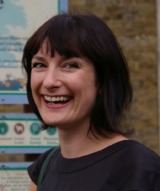From the grassroots
SARA HYDE: Shared expertise and resilience are key to addressing the scourge of violence on our streets
The community which I represent in the London borough of Islington has had more than its fair share of untimely, tragic deaths over the last decade. Last week marked the first anniversary of one such death and so it is a difficult time for a lot of people here. For people interested in politics and therefore in power and how we use it, there can be few more pressing issues than how we deal with the impact on our young people of knife crime.
Young people should not be dying on our streets full stop.
The roots of some of the darkest and most dangerous crimes are poverty, child abuse, parents who are addicts, growing up in a home with domestic violence rather than laziness or evil. I sit on the panel that scrutinises our borough’s youth offending statistics. We have a small cohort of young people who are prolific in committing crimes and the thing they all have in common is that every single one of them grew up in a home with domestic violence.
If we understand the complex web of factors that cause our young people to get into criminal and violent behaviours and lifestyles, we have a far better chance of helping them find a way out. Clearly these are not things we can deal with from a distance or police our way out of. Punishment and fear drive this behaviour, they don’t solve it.
We have to work with the victims, our communities and those with lived experience if we are to see a drop in youth crime, in gang crime, in knife crime and county lines (drug running from cities to towns). We need to listen hard, creating spaces for listening to happen and then co-producing policy with those whose lives have the greatest experience of it.
There is lots of good work going on across London, usually through small grassroots voluntary sector organisations which manage to keep going through thick and thin to remain a safe space for their communities. Many of these organisations were born out of personal tragedy and a determination to see that no-one else would have to suffer the same grief. Inspirational organisations like Hackney Quest which create a community, offer ongoing support year in and year out to families and young people. Like Arsenal in the Community, whose average staff tenure is over a decade and are working with the children of those they once worked with as children, young people and as adults, upskilling people and diverting them from crime. Like Abianda, working with young women who have exited gangs or gang affiliation who now train professionals about young women and gangs. These organisations reach out. They provide safety. They provide the opportunity to belong and to take pride in something and to have an identity other than crime. They know how to prevent crime in the first place and how to walk alongside people, supporting them into crime-free lives.
We need to harness the power of these local lifesavers, bringing their learning and models to a wider audience and sharing best practice. It’s imperative we learn from those who’ve had the hardest experiences and have important things to tell us. We cannot be tin-eared. There is deep wisdom and resilience in my community, which has helped us weather some of the worst things that can happen, together. It’s not just a shame if that wisdom and resilience stays in one community, it’s a waste. We need urgently to find ways to ensure the voices of those with lived experience influence our policies for the better on knife crime, youth crime and the most difficult issues facing our city.
Photo: flickr/Alan Cleaver

